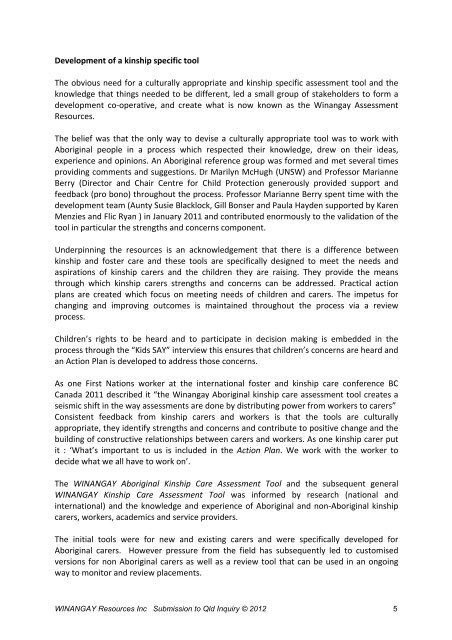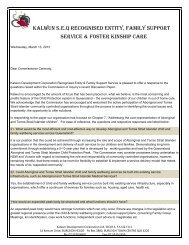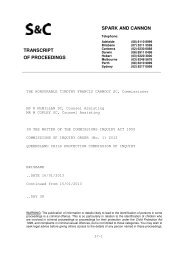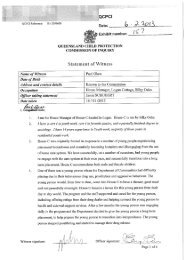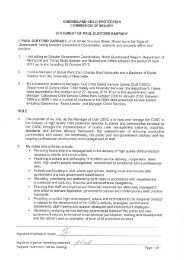Winangay Resources Inc - Queensland Child Protection ...
Winangay Resources Inc - Queensland Child Protection ...
Winangay Resources Inc - Queensland Child Protection ...
You also want an ePaper? Increase the reach of your titles
YUMPU automatically turns print PDFs into web optimized ePapers that Google loves.
Development of a kinship specific tool<br />
The obvious need for a culturally appropriate and kinship specific assessment tool and the<br />
knowledge that things needed to be different, led a small group of stakeholders to form a<br />
development co‐operative, and create what is now known as the <strong>Winangay</strong> Assessment<br />
<strong>Resources</strong>.<br />
The belief was that the only way to devise a culturally appropriate tool was to work with<br />
Aboriginal people in a process which respected their knowledge, drew on their ideas,<br />
experience and opinions. An Aboriginal reference group was formed and met several times<br />
providing comments and suggestions. Dr Marilyn McHugh (UNSW) and Professor Marianne<br />
Berry (Director and Chair Centre for <strong>Child</strong> <strong>Protection</strong> generously provided support and<br />
feedback (pro bono) throughout the process. Professor Marianne Berry spent time with the<br />
development team (Aunty Susie Blacklock, Gill Bonser and Paula Hayden supported by Karen<br />
Menzies and Flic Ryan ) in January 2011 and contributed enormously to the validation of the<br />
tool in particular the strengths and concerns component.<br />
Underpinning the resources is an acknowledgement that there is a difference between<br />
kinship and foster care and these tools are specifically designed to meet the needs and<br />
aspirations of kinship carers and the children they are raising. They provide the means<br />
through which kinship carers strengths and concerns can be addressed. Practical action<br />
plans are created which focus on meeting needs of children and carers. The impetus for<br />
changing and improving outcomes is maintained throughout the process via a review<br />
process.<br />
<strong>Child</strong>ren’s rights to be heard and to participate in decision making is embedded in the<br />
process through the “Kids SAY” interview this ensures that children’s concerns are heard and<br />
an Action Plan is developed to address those concerns.<br />
As one First Nations worker at the international foster and kinship care conference BC<br />
Canada 2011 described it “the <strong>Winangay</strong> Aboriginal kinship care assessment tool creates a<br />
seismic shift in the way assessments are done by distributing power from workers to carers”<br />
Consistent feedback from kinship carers and workers is that the tools are culturally<br />
appropriate, they identify strengths and concerns and contribute to positive change and the<br />
building of constructive relationships between carers and workers. As one kinship carer put<br />
it : ‘What’s important to us is included in the Action Plan. We work with the worker to<br />
decide what we all have to work on’.<br />
The WINANGAY Aboriginal Kinship Care Assessment Tool and the subsequent general<br />
WINANGAY Kinship Care Assessment Tool was informed by research (national and<br />
international) and the knowledge and experience of Aboriginal and non‐Aboriginal kinship<br />
carers, workers, academics and service providers.<br />
The initial tools were for new and existing carers and were specifically developed for<br />
Aboriginal carers. However pressure from the field has subsequently led to customised<br />
versions for non Aboriginal carers as well as a review tool that can be used in an ongoing<br />
way to monitor and review placements.<br />
WINANGAY <strong>Resources</strong> <strong>Inc</strong> Submission to Qld Inquiry © 2012 5


